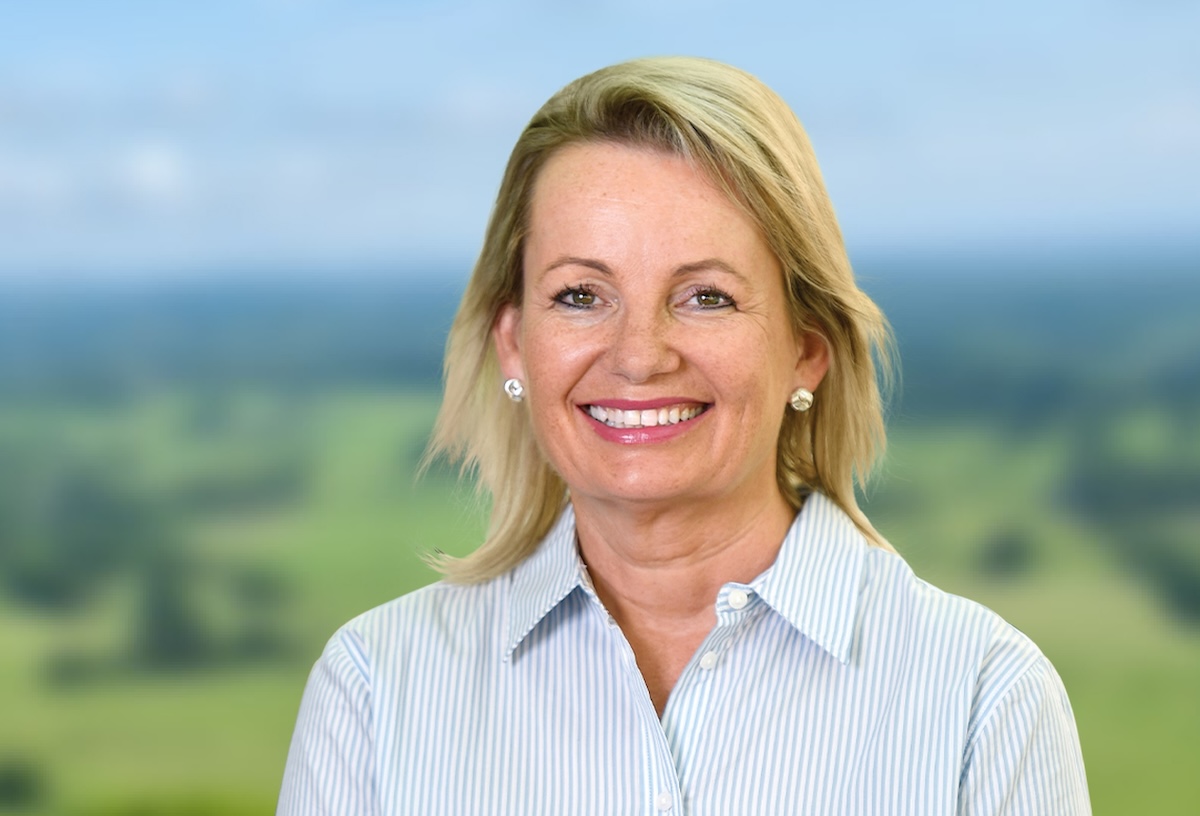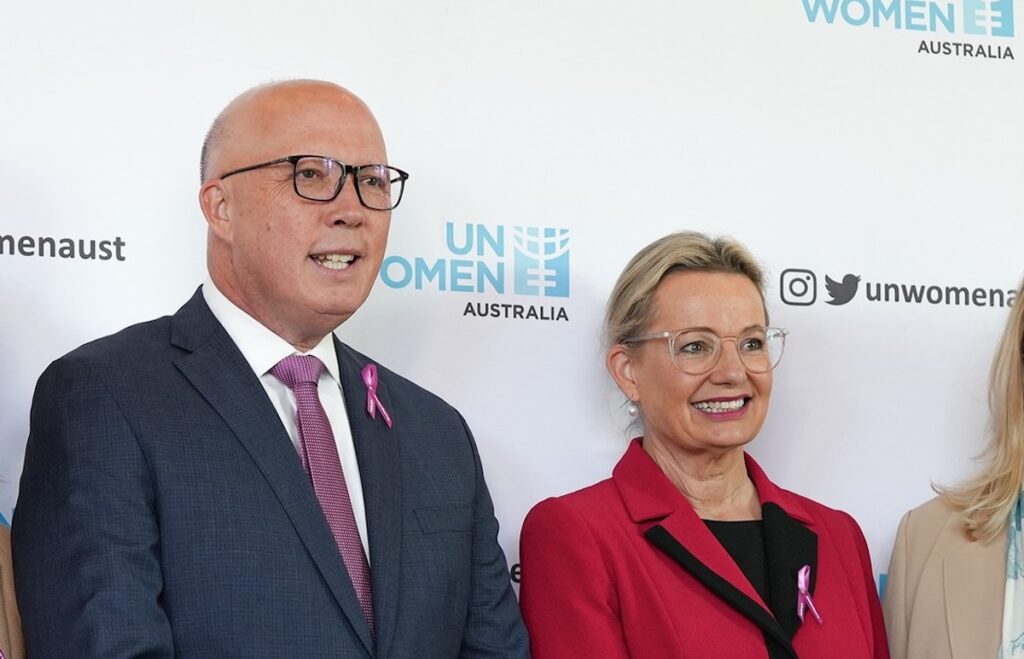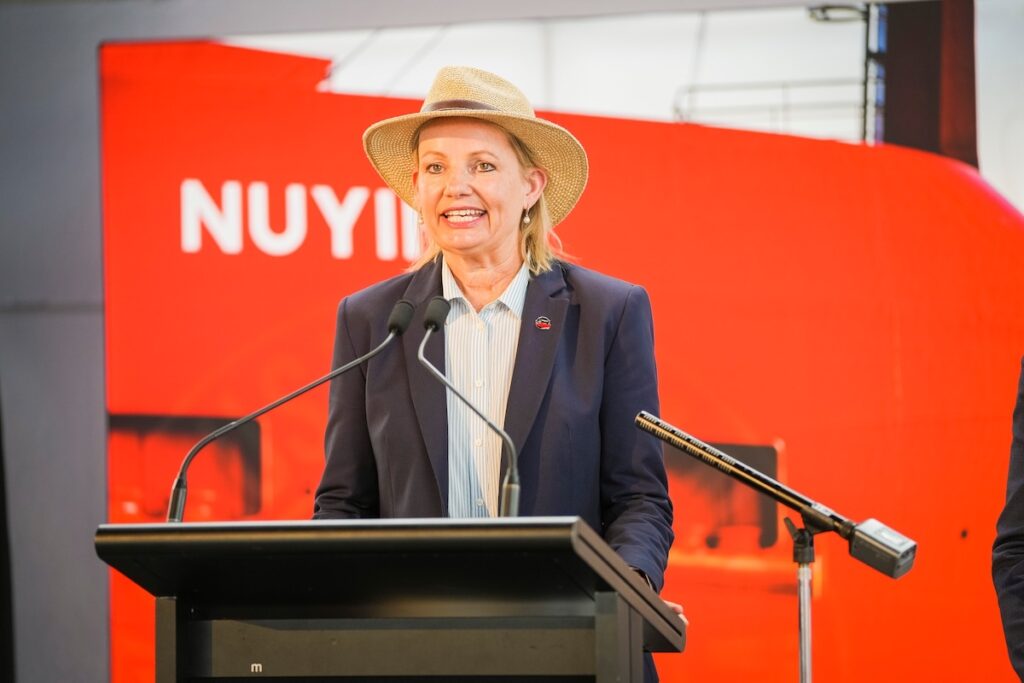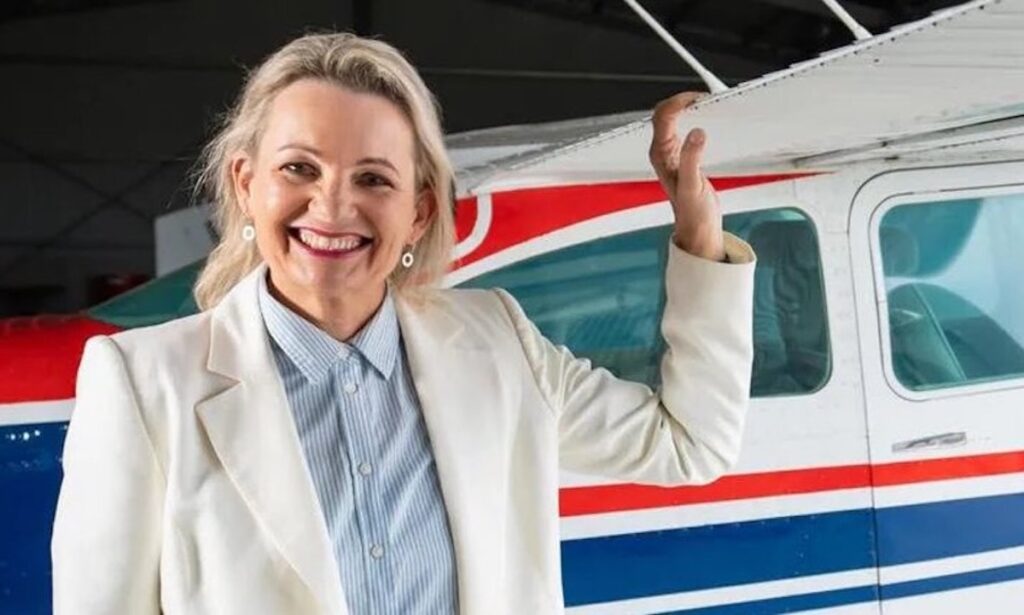We’ve got a new leader of the Liberal Party. Meet Sussan Ley, the first woman to ever lead the party.
Who is Sussan Ley?
Born in Kano, Nigeria, in 1961 to British parents, Ley spent her early years in the United Arab Emirates and England before migrating to Australia at the age of 13. Her diverse background includes working as a commercial pilot, air traffic controller, farmer, and public servant. She holds a Bachelor of Economics, a Master’s in Taxation Law, and a Master’s in Accounting. Ley entered politics in 2001, representing the New South Wales seat of Farrer, and has since held various ministerial roles, including Minister for Health, Aged Care, and the Environment.
Sussan Ley has three kids to her former husband, John Ley (the two divorced in 2004 after 17 years).
She won the leadership by a narrow margin
Sussan Ley has emerged as the new leader of the Liberal Party after a tight internal contest on Tuesday, defeating fellow frontbencher Angus Taylor by just four votes in the party room ballot. In the end, the votes were 29 to 25 in Ley’s favour. It’s to be expected from a party that was so rocked by the last election.
Unlike the more centre-right Ley, Taylor is a prominent conservative. He sought to appeal to what was left of the Libs’ right flank in a bid to keep the party tilting towards more Dutton-eseque politics.
Not only will Ley face a tricky battle in the party room going forward having won by such a narrow margin, she also has the Nationals to contend with. Nats candidates closed the gap on the Libs in the last election, leaving them one short of being in a dead heat – 15 seats to 16 for the Libs. It leaves her with a tricky tightrope to walk between her own colleagues and her Nationals’ coalition.
Ted O’Brien was elected as Ley’s deputy. He’s a Queenslander and a former barrister in the Victorian Bar with a focus on commercial law.
Other candidates, including the newly-defected Country MP turned Liberal, firebrand Senator Jacinta Nampijinpa Price, have now withdrawn their candidacy.
Ley said in a statement regarding her election to the new position of Liberal leader, she said that it’s “clear that we got it wrong, and that Australia expects a change in direction and a fresh approach from the Liberal Party”.
She added:
- “The Liberal Party needs to listen to the Australian people and meet them where they are. We need to understand their aspirations.”
- “We need to build a new economic narrative. We need new policy offerings that show Australians we can help them and their families get ahead.”
- “We need to listen and we need to change.”
- “The Liberal Party must respect modern Australia, reflect modern Australia and represent modern Australia.”
She’s well-qualified
Ley knows her stuff. Her schooling saw her earn a master’s degree in taxation and another in accountancy, along with other tertiary qualifications in education and economics. She was actually Shadow Assistant Treasurer in the last Parliament alongside the now-defeated Angus Taylor.
In a world where issues like the Super Tax, government incentives and potential future tax cuts are going to dominate the agenda, she’s got the know-how to take it to the Albanese Government.
She understands what Aussies are facing
Ley has consistently positioned herself as in touch with the day-to-day pressures Australians face, particularly around cost of living. During the election campaign and her leadership bid, she focused heavily on household budget pressures, high grocery and energy prices, and interest rate pain for mortgage holders.
When her British parents moved to Australia from the UAE, the worked on a farm. Unfortunately the farm quickly collapsed and they moved closer to Canberra as a result. These rural roots mean she’s well-versed in the issues affecting farmers and regional Australia. She has often spoken out about biosecurity risks, water policy, and supply chain issues, and she is seen as a reliable advocate for rural Australians within her party. It’ll help in her dealings with electorates that were easily-held by the Nationals in the election.
She’s the first woman to ever hold the job
Ley’s elevation marks a historic milestone: she is the first woman ever elected to lead the Liberal Party. It’s a moment that comes amid ongoing criticism of the party’s record on gender equity and female representation, both in Parliament and among its voter base.
A self-described feminist, Ley has long spoken about the need for more women in politics and more attention to issues affecting women — from economic participation to childcare access and family safety. Her promotion could offer the Liberals a much-needed reset in their engagement with female voters. It’s a cohort of voters that have been well-alienated by the Liberals in the past, both from a policy and behavioural standpoint.
It’s something she recognises amid her election to the top job:
“Many Australians, including women and younger Australians, feel neglected by the Liberal Party. We must rebuild trust with all sections of Australian society and my election as Leader of the Liberal Party would send a very strong signal that we understand things need to be done differently.”
Ley’s leadership hopefully now lays the foundations for elevating more women into Liberal shadow cabinet positions.
She has a long resume
Before politics, Ley lived many lives. She earned her commercial pilot’s licence at age 20, worked as a shearers’ cook on farms, trained briefly as an air traffic controller, and ultimately became a senior technical training director at the Australian Taxation Office in Albury.
These experiences have often been cited as evidence of her down-to-earth character and practical instincts. They also helped her build strong connections with regional voters in her seat of Farrer, which she has held since 2001. By the way, Farrer did see a 3.5% swing away from Ley during the last election but she still handily defeated her Labor rival by double the votes. Unlike previous leader Peter Dutton who not only lost the election but lost his seat in the process.
Her non-linear path into politics sets her apart from many of her colleagues, who followed more conventional legal or policy adviser routes. It also contributes to her image as a “real person” in politics — someone who’s worked with her hands, not just her head.
She’s fought for new mining and fossil fuel projects, even in court
As Environment Minister in the Morrison Government, Ley approved multiple new fossil fuel projects, including coal mines, sparking controversy among environmental groups and climate advocates. Her tenure was defined by a pro-development stance and several battles in the nation’s courts.
One of the most high-profile cases was a Federal Court ruling that she had a duty of care to protect children from the impacts of climate change when approving coal projects. Ley appealed the ruling — and won. The move was criticised by climate campaigners but supported by industry.
She was also accused of withholding key environmental documents, including those related to fast-tracked project approvals. Her department faced a legal challenge from the Australian Conservation Foundation over a lack of transparency.
Ley’s environmental record makes her popular with pro-mining and regional voters, but it’s also a flashpoint for climate activists and younger Australians who see it as out of step with global efforts to reduce emissions.
She already has a few scandals behind her
Ley’s political career hasn’t been scandal-free. In 2017, she resigned from cabinet after it was revealed she purchased a Gold Coast apartment while on a taxpayer-funded trip. Although she insisted the trip met entitlement rules, the public backlash was significant. She repaid these costs accordingly.
In 2024, she came under fire for linking a crime incident in Victoria to “foreign criminals” — despite police later dropping the charges and confirming the accused was not foreign-born. The PM denounced the “divisive” comments.
Her odd 2025 Australia Day comments also sparked controversy when she compared British colonisation of Australia to Elon Musk’s planned colonisation of Mars:
“All those years ago those ships did not arrive, as some would have you believe, as invaders. They did not come to destroy or to pillage. In what could be compared to Elon Musk’s Space X’s efforts to build a new colony on Mars, men in boats arrived on the edge of the known world to embark on that new experiment. A new experiment and a new society. And just like astronauts arriving on Mars, those first settlers would be confronted with a different and strange world, full of danger, adventure and potential.”
Okay, Sussan.
She added an extra “S” to her name after reading about numerology
In one of the more unusual facts about her personal journey, Ley legally changed the spelling of her name from “Susan” to “Sussan” after reading about numerology. She has said the change was based on advice that the added letter would bring more balance and luck to her life. As a centre-right, newly-elected leader of the Liberal Party and the first woman to do it, it seems to be going well?
Her stance on the issues
Here’s what she’s voted for and against, according to vote-tracking site They Vote For You:
| Voted consistently For | Voted almost always For | Voted generally For | Voted for a mixture of For and Against | Voted generally Against | Voted almost always Against | Voted consistently against |
|---|---|---|---|---|---|---|
| A citizenship test | Unconventional gas mining | A character test for Australian visas | Increasing competition in bulk wheat export | Implementing refugee and protection conventions | A minerals resource rent tax | A carbon price |
| A combined Federal Circuit and Family Court of Australia | Banning mobiles and other devices in immigration detention | Increasing Aboriginal land rights | Increasing investment in renewable energy | A Royal Commission into Violence and Abuse against People with Disability | ||
| A plebiscite on the carbon pricing mechanism | Increasing or removing the Government debt limit | Increasing scrutiny of asylum seeker management | Increasing support for rural and regional Australia | A transition plan for coal workers | ||
| A same-sex marriage plebiscite | Regional processing of asylum seekers | Net zero emissions by 2050 | Letting all MPs or Senators speak in Parliament (procedural) | Banning pay secrecy clauses | ||
| An Australian Building and Construction Commission (ABCC) | Speeding things along in Parliament (procedural) | Reducing tax concessions for high socio-economic status | Build to Rent (BTR) | |||
| An emissions reduction fund | Temporary protection visas | Reproductive bodily autonomy | Building dedicated quarantine facilities (COVID-19) | |||
| Charging postgraduate research students fees | Turning back asylum boats when possible | Suspending the rules to allow a vote to happen (procedural) | Carbon farming | |||
| Compensating victims of overseas terrorism since the September 11 attack | Civil celebrants having the right to refuse to marry same-sex couples | |||||
| Decreasing availability of welfare payments | Considering legislation to create a federal anti-corruption commission (procedural) | |||||
| Deregulating undergraduate university fees | Criminalising wage theft | |||||
| Drug testing welfare recipients | Decreasing the private health insurance rebate | |||||
| Getting rid of Sunday and public holiday penalty rates | Doctor-initiated medical transfers for asylum seekers | |||||
| Government administered paid parental leave | Encouraging Australian-based industry | |||||
| Greater control over items brought into immigration detention centres | Ending illegal logging | |||||
| Having a referendum on whether to create an Indigenous Voice to Parliament | Ending immigration detention on Manus Island | |||||
| Increasing availability of abortion drugs | Ending immigration detention on Nauru | |||||
| Increasing eligibility requirements for Australian citizenship | Extending government benefits to same-sex couples | |||||
| Increasing funding for road infrastructure | Federal action on public housing | |||||
| Increasing indexation of HECS-HELP debts | Federal government action on animal & plant extinctions | |||||
| Increasing scrutiny of unions | Increasing access to subsidised childcare | |||||
| Increasing state and territory environmental approval powers | Increasing access to the JobKeeper Payment | |||||
| Increasing the cost of humanities degrees | Increasing consumer protections | |||||
| Increasing the initial tax rate for working holiday makers to 19% | Increasing fishing restrictions | |||||
| Increasing the Medicare Levy to pay for the National Disability Insurance Scheme | Increasing funding for university education | |||||
| Increasing the price of subsidised medicine | Increasing housing affordability | |||||
| Live animal export | Increasing legal protections for LGBTI people | |||||
| Making more water from Murray-Darling Basin available to use | Increasing marine conservation | |||||
| Prioritising religious freedom | Increasing penalties for breach of data | |||||
| Privatising certain government services | Increasing political transparency | |||||
| Privatising government-owned assets | Increasing protection of Australia’s fresh water | |||||
| Putting welfare payments onto cashless debit cards (or indue cards) on a temporary basis as a trial | Increasing restrictions on gambling | |||||
| Putting welfare payments onto cashless debit cards (or indue cards) on an ongoing basis | Increasing support for the Australian film and TV industry | |||||
| Recognising local government in the Constitution | Increasing support for the Australian shipping industry | |||||
| Reducing the corporate tax rate | Increasing the age pension | |||||
| Senate electoral reform | Increasing the diversity of media ownership | |||||
| Stem cell research | Increasing trade unions’ powers in the workplace | |||||
| Stopping people who arrive by boat from ever coming to Australia | Increasing transparency of big business by making information public | |||||
| The Coalition’s new schools funding policy (“Gonski 2.0”) | Increasing workplace protections for women | |||||
| The Intervention in the Northern Territory | Introducing digital ID | |||||
| The territories being able to legalise euthanasia | Letting environmental groups challenge the legality of certain government decisions | |||||
| Voluntary student union fees | Making TAFE education fee-free | |||||
| Net zero emissions by 2035 | ||||||
| Parliament continuing to meet during the COVID-19 pandemic | ||||||
| Protecting threatened forest and bushland habitats | ||||||
| Re-approving/ re-registering agvet chemicals | ||||||
| Reducing tax on lowest income bracket | ||||||
| Requiring every native title claimant to sign land use agreements | ||||||
| Restricting donations to political parties | ||||||
| Restricting foreign ownership | ||||||
| Same-sex marriage equality | ||||||
| Stopping tax avoidance or aggressive tax minimisation | ||||||
| The Australian Renewable Energy Agency (ARENA) | ||||||
| The Carbon Pollution Reduction Scheme | ||||||
| The Paris Climate Agreement | ||||||
| Tobacco plain packaging | ||||||
| Transgender rights | ||||||
| Treating the COVID vaccine rollout as a matter of urgency | ||||||
| Vehicle efficiency standards |







